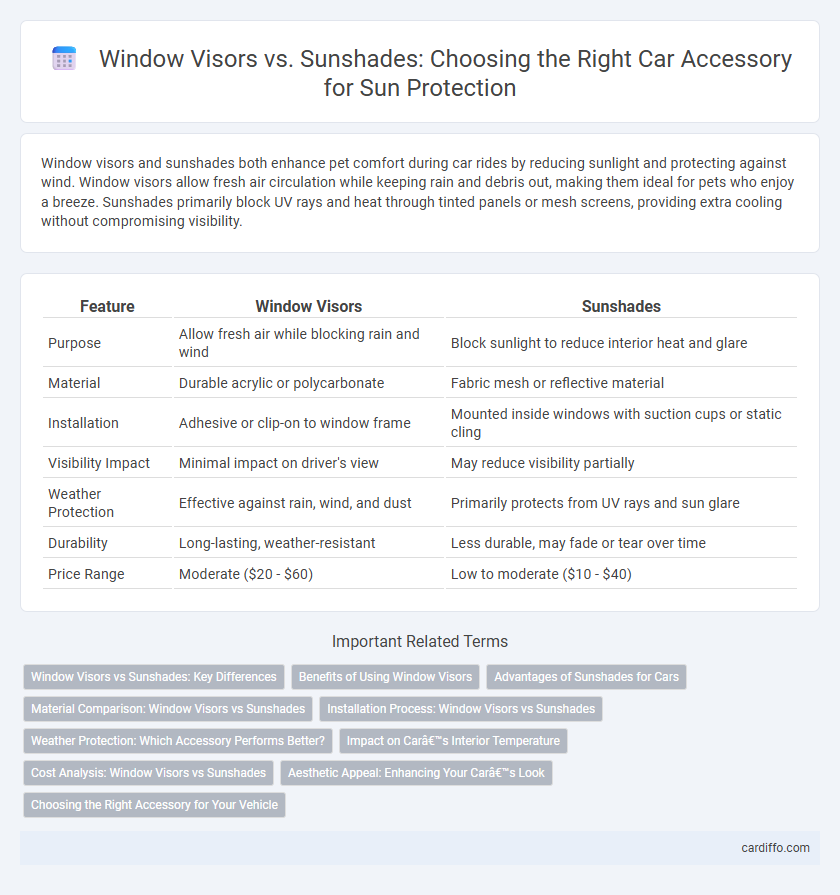Window visors and sunshades both enhance pet comfort during car rides by reducing sunlight and protecting against wind. Window visors allow fresh air circulation while keeping rain and debris out, making them ideal for pets who enjoy a breeze. Sunshades primarily block UV rays and heat through tinted panels or mesh screens, providing extra cooling without compromising visibility.
Table of Comparison
| Feature | Window Visors | Sunshades |
|---|---|---|
| Purpose | Allow fresh air while blocking rain and wind | Block sunlight to reduce interior heat and glare |
| Material | Durable acrylic or polycarbonate | Fabric mesh or reflective material |
| Installation | Adhesive or clip-on to window frame | Mounted inside windows with suction cups or static cling |
| Visibility Impact | Minimal impact on driver's view | May reduce visibility partially |
| Weather Protection | Effective against rain, wind, and dust | Primarily protects from UV rays and sun glare |
| Durability | Long-lasting, weather-resistant | Less durable, may fade or tear over time |
| Price Range | Moderate ($20 - $60) | Low to moderate ($10 - $40) |
Window Visors vs Sunshades: Key Differences
Window visors are designed to allow fresh air circulation while protecting the interior from rain and reducing wind noise, whereas sunshades primarily block direct sunlight to keep the vehicle's interior cooler. Window visors are typically installed on the upper edge of car windows and enable windows to be slightly open during adverse weather conditions. Sunshades, often made from reflective materials, are placed inside the windshield or windows to prevent UV rays and heat buildup, offering a different type of comfort and protection.
Benefits of Using Window Visors
Window visors enhance vehicle comfort by allowing fresh air circulation while keeping rain and wind out, reducing the need to use air conditioning and improving fuel efficiency. They help minimize glare from the sun without obstructing the view, increasing driver safety during bright conditions. Additionally, window visors protect the interior from UV damage and reduce fogging on windows, contributing to a longer-lasting vehicle interior and better visibility.
Advantages of Sunshades for Cars
Sunshades for cars offer superior UV protection that helps prevent interior fading and reduces heat buildup, enhancing driver and passenger comfort. Unlike window visors, sunshades block direct sunlight through the windshield and side windows, effectively lowering cabin temperature. Their ease of installation and compact storage make them a convenient accessory for improving vehicle climate control and protecting upholstery.
Material Comparison: Window Visors vs Sunshades
Window visors are typically made from durable acrylic or polycarbonate, offering strong resistance to weather and impact, while sunshades usually consist of lightweight, reflective fabrics or mesh designed to block UV rays and reduce heat. The rigid material of window visors ensures long-lasting protection against rain and wind, whereas sunshades prioritize breathability and easy storage with flexible, foldable construction. Material quality in window visors enhances ventilation without letting rain inside, whereas sunshades excel in sun protection with materials that absorb and reflect sunlight effectively.
Installation Process: Window Visors vs Sunshades
Window visors typically feature an easy, no-drill installation using strong 3M adhesive tape that securely attaches to the window frame, allowing for quick setup without professional help. Sunshades often require a more intricate process involving suction cups or clips that must be carefully positioned inside the window, which can take longer and may be less stable during driving. The simplicity and durability of the window visor installation make it a preferred choice for drivers seeking hassle-free, long-lasting sun protection accessories.
Weather Protection: Which Accessory Performs Better?
Window visors provide superior weather protection by allowing fresh air circulation while preventing rain and snow from entering the vehicle, making them ideal for wet conditions. Sunshades primarily block sunlight and reduce interior heat but offer limited protection against precipitation and wind. For comprehensive weather defense, window visors outperform sunshades by combining ventilation benefits with effective shielding from weather elements.
Impact on Car’s Interior Temperature
Window visors reduce interior heat by allowing windows to be slightly open during hot weather, promoting airflow while blocking rain and direct sunlight. Sunshades primarily block sunlight when the car is parked, significantly lowering the interior temperature by reflecting UV rays and reducing heat buildup. Using both accessories together offers optimal temperature control inside the car.
Cost Analysis: Window Visors vs Sunshades
Window visors typically cost between $20 to $100 per set, offering a durable and long-lasting solution for reducing wind noise and deflecting rain while driving. Sunshades are generally less expensive, ranging from $10 to $50, but they provide primarily UV protection and temperature control without improving aerodynamics or ventilation. Evaluating the value, window visors present a higher upfront investment with greater multifunctional benefits, whereas sunshades offer a budget-friendly option primarily focused on interior cooling and sun protection.
Aesthetic Appeal: Enhancing Your Car’s Look
Window visors provide a sleek, streamlined appearance that subtly enhances the car's profile while maintaining visibility and functionality. Sunshades, often larger and more visually prominent, add a bold statement to the vehicle's style by offering varied designs and colors that reflect personality. Both accessories elevate a car's aesthetic appeal but cater to different tastes--window visors prioritize subtle elegance, whereas sunshades emphasize vibrant customization.
Choosing the Right Accessory for Your Vehicle
Window visors provide ventilation by allowing air circulation while protecting against rain, making them ideal for reducing wind noise and keeping the interior dry. Sunshades primarily block harmful UV rays and reduce heat buildup inside the vehicle, enhancing comfort and protecting the dashboard from sun damage. When choosing the right accessory, consider your driving habits, climate conditions, and whether ventilation or sun protection is a higher priority for your vehicle.
Window visors vs Sunshades Infographic

 cardiffo.com
cardiffo.com